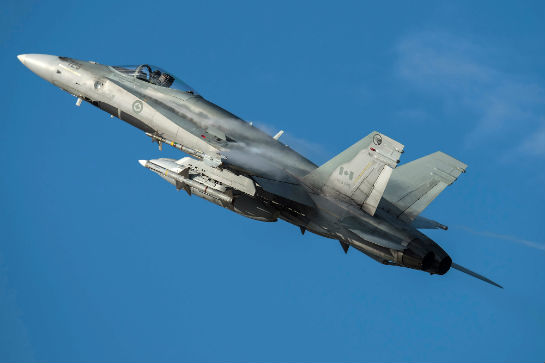Estimated reading time 4 minutes, 41 seconds.
Minister of Finance Bill Morneau said the government would be nonetheless “steadfast” on all security issues, including choosing new fighters. Stuart Sanders Photo
Ongoing delays in the replacement of the Royal Canadian Air Force’s remaining Boeing CF-188 Hornet fighters has prompted the new Liberal government to effectively sequester the procurement funds until at least the 2021-2022 fiscal year.
Confirming the decision in his first budget, Minister of Finance Bill Morneau said March 22 the government would be nonetheless “steadfast” on all security issues, including choosing new fighters as well as warships, and that the procurement process would be transparent.
“To ensure that funding is available when key capital acquisitions will be made, we will reallocate funding for large-scale capital projects from the 2015–16 to 2020–21 period to future years,” the government said in its main budget document. “This funding is being shifted into future years to align with the timing of major equipment acquisitions.”
During a news conference within the media budget lockup, Morneau said the “reprofiled” procurement funding was “the appropriate action to take to make sure that our military has the appropriate equipment . . . that they need.”
While reprofiling, deferment or sequestration aren’t new concepts within the Department of National Defence—which has struggled for years to spend authorized funds, and has routinely seen unspent funds rolled into subsequent fiscal years—the politically-contentious fighter replacement program has been stalled for years and remains under review by a National Fighter Procurement Secretariat within Public Works and Procurement Canada.
When the department was still called Public Works and Government Services Canada, it told Skies that “until a decision is taken on the path forward, all options remain on the table.” That was a year ago and it remains the case.
An independent review last year by Raymond Chabot Grant Thornton, an accounting firm and consultancy commissioned by the National Fighter Procurement Secretariat, indicates the estimated overall 40-year life-cycle costs of a new fighter rose by 0.3 per cent last year to an estimated $44.8 billion.
Despite the fighter funding postponement, Morneau promised more immediate aerospace-related funding, including upgrades to federally-managed airports over the next five years as part of a $3.4-billion infrastructure fund.
In addition, the federal government will implement what Morneau called “the highest annual funding increase in over a decade” for research and development through its granting bodies, including the National Research Council, which has an active aerospace component.
Up to $379 million over eight years has been promised to the Canadian Space Agency (CSA) to extend Canada’s participation in the International Space Station (ISS) to at least 2024.
“These investments all reflect our core belief that the advancement of basic science and the development of intellectual capacity is the foundation of innovation,” Morneau told the House, promising $800 million over four years to support innovation networks and clusters.
“Businesses, post‑secondary institutions, governments and other stakeholders can work together to accelerate economic growth.”
Jim Quick, president of the Aerospace Industries Association of Canada (AIAC), welcomed the support for innovation and the government’s commitment to procurement transparency. “We look forward to working with them on the development of the innovation and defence strategies in the months ahead,” he said in a statement.
On the extended commitment to the CSA and ISS, Quick said it would create “important opportunities” for Canadian industry. “This budget commitment is an important step towards the development of a long-term vision for Canada’s future in space, and we look forward to continuing to work with the government to ensure that Canada’s reputation as a global space leader is sustained for many years to come.”

